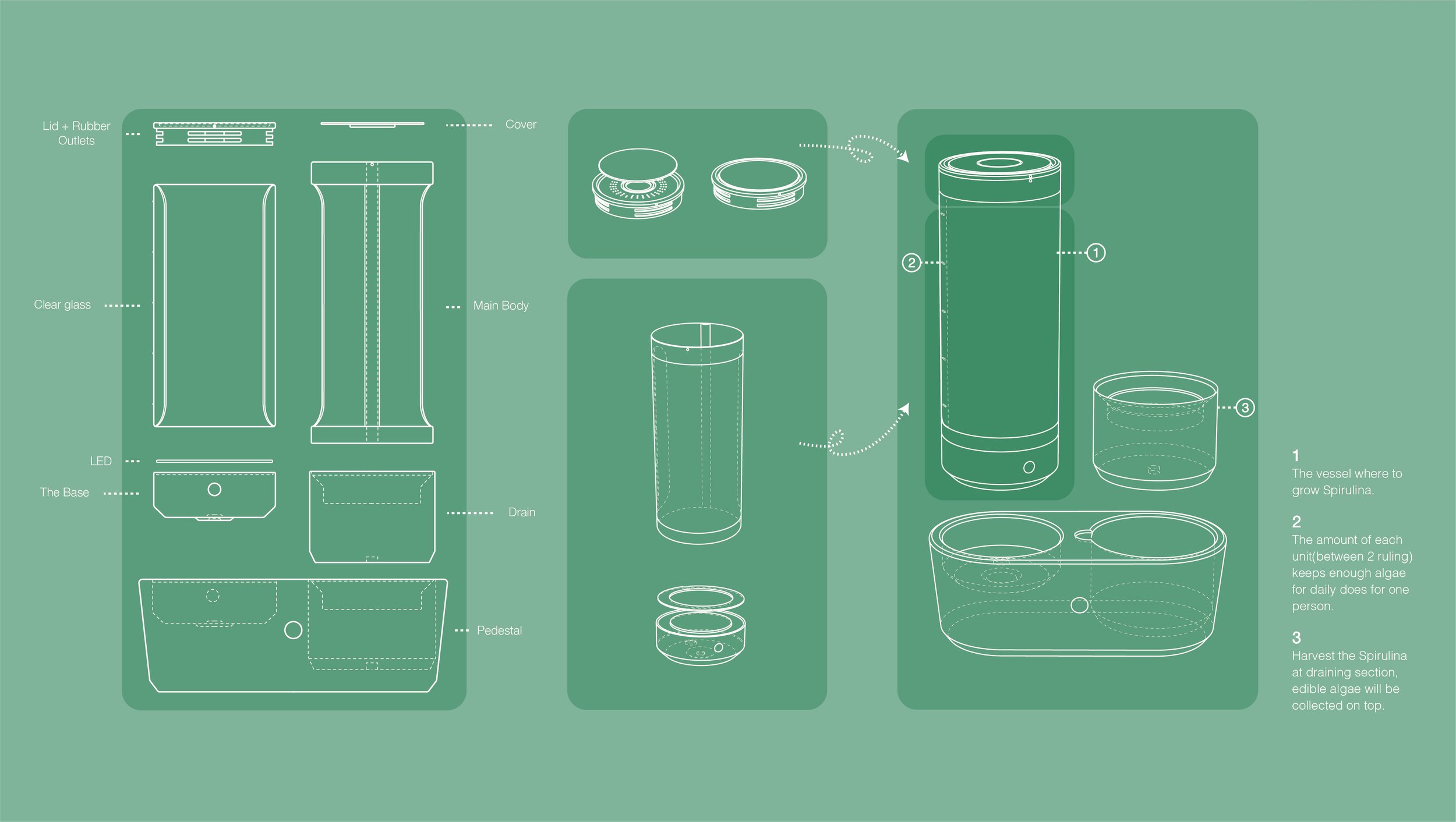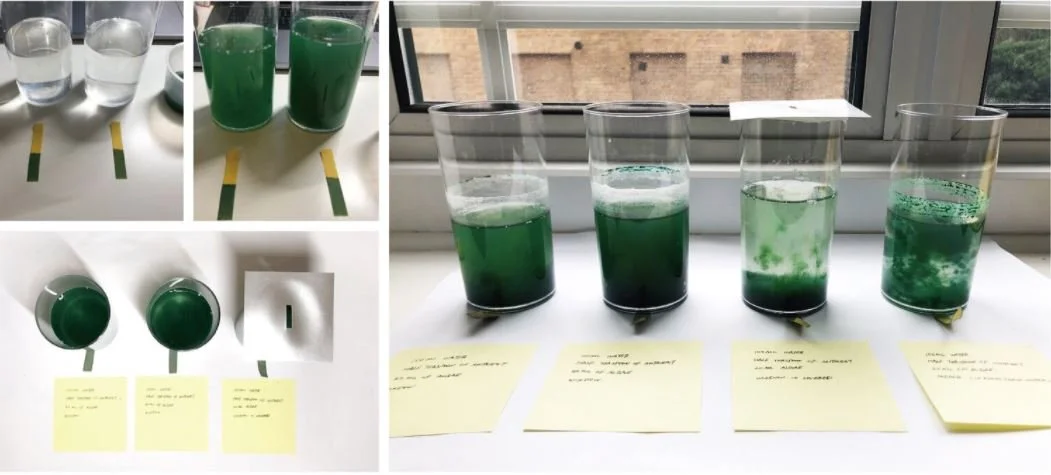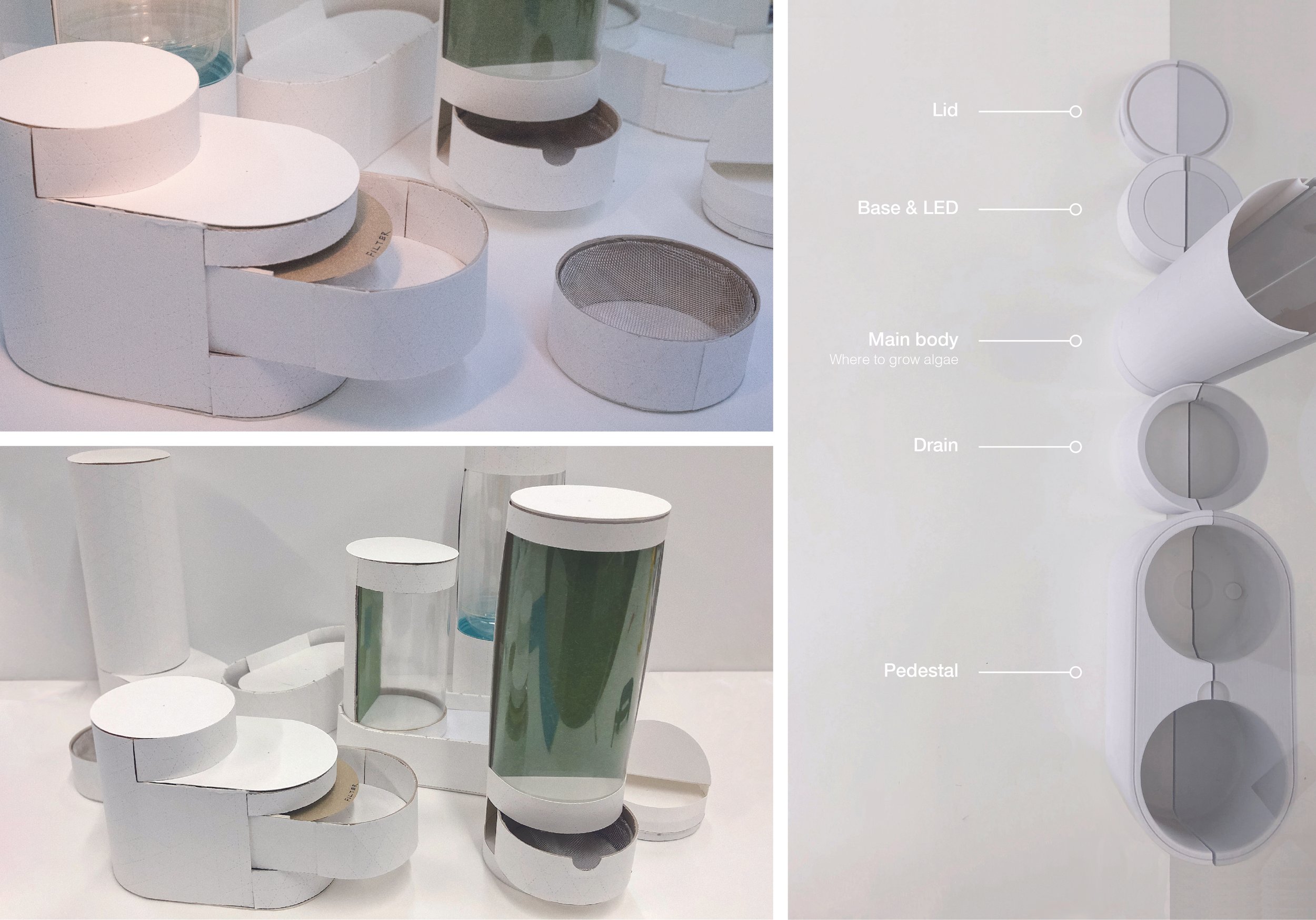Zhenjing Lang's project focuses on integrating Spirulina, an ancient superfood, into urban lifestyles for sustainable food sourcing. The concept involves an algae hydroponic farm designed as a homeware device for home use, addressing the environmental impact of human activities and food scarcity. It aims to bridge modern urban living with natural food sources, offering a solution for vegans and those seeking natural dietary alternatives. Spirulina is chosen for its high nutritional value, non-toxicity, and health benefits against various ailments, aligning with the project's goal of easy, in-home cultivation and consumption.
Hello! Algae
Nov 18, 2023
Materials
Connetion : +53122
Shares : 32144
The escalating impact of human activities on the environment is an irrefutable fact, with a future marked by increasingly severe floods, more intense droughts, and more frequent, unpredictable, and violent storms in a warming world.
In response to these challenges, Zhenjing Lang has conceptualized a project centered on an innovative approach to urban farming. This project is specifically focused on the cultivation, harvesting, and consumption of Spirulina within an urban environment. Its primary objective is to create a bridge between the fast-paced modern urban lifestyle and natural, traditional food sources. The project particularly emphasizes integrating Spirulina, a superfood recognized as one of the world's oldest food sources, into daily diets. Spirulina, having gained attention for its future potential and endorsed by NASA, is renowned for its high nutritional value, absence of toxicity, and its beneficial effects in combating viral infections, anaemia, tumor growth, and malnutrition.
Lang's design introduces an algae hydroponic farm conceptualized as a homeware device. This automated ecosystem is custom-designed for use by individuals or families in their own homes, thereby streamlining the process of food production to the point of consumption. The design specifically caters to vegans in search of plant-based dietary options and to those individuals who prefer natural, home-grown alternatives to pharmaceutical dietary supplements.
The design concept focuses on an algae farm that integrates three primary functions: growth, collection, and drainage. This ideation emphasizes functionality, particularly in protecting spirulina from external factors and achieving an automated ecosystem. The design aims to seamlessly connect urban environments with natural processes, addressing the increasing disconnect between modern living and traditional nature-based practices.
In terms of technical specifications, critical factors for spirulina cultivation include light, temperature, air supply, nutrition, and mixing. These elements not only influence the growth of the algae but also affect the product's final appearance.
The project emerges against a backdrop of a deteriorating supply chain, exacerbated by a growing population and diminishing resources. This decline poses a significant risk of food insecurity. In response, the project presents an algae hydroponic farm designed for home use. This device functions as a homeware item, equipped with an automated ecosystem suitable for individual or family use. Its primary goal is to enable food production in close proximity to consumption points.
Targeted primarily at vegans seeking plant-based food options, the project also appeals to those who wish to transition from pharmaceutical dietary supplements to naturally homegrown alternatives. This innovation not only addresses dietary preferences but also contributes to resolving supply chain challenges by localizing food production.
人類活動對環境的影響日益加劇是不爭的事實,未來將面臨更嚴重的洪水、更強烈的乾旱,以及在暖化的世界中更頻繁、不可預測和更猛烈的風暴。
為因應這些挑戰,Zhenjing Lang 構思了一個以創新方式進行城市農耕的計畫。 該計畫專注於城市環境中螺旋藻的種植、收穫和消費。 其主要目標是在快節奏的現代城市生活方式與自然、傳統食物來源之間建立橋樑。 該計畫特別強調將螺旋藻這種作為世界上最古老食物來源之一的超級食物融入日常飲食中。 螺旋藻因其未來潛力而受到關注,並得到美國NASA的認可,以其高營養價值、無毒性以及在對抗病毒感染、貧血、腫瘤生長和營養不良方面的益處而聞名。
Zhenjing Lang 的設計引入了一個被構想為家用設備的藻類水耕農場。 這個自動化生態系統專為個人或家庭在自己家中使用而量身設計,從而使食品生產過程直到消費點變得簡便。 該設計特別迎合那些尋找基於植物的飲食選擇的素食者,以及那些更喜歡自然、家庭種植替代藥物膳食補充品的個人。
設計理念專注於一個融合三個主要功能的藻類農場:生長、收集和排水。 這種構思強調功能性,特別是在保護螺旋藻免受外部因素影響和實現自動化生態系統方面。 該設計旨在將城市環境與自然過程無縫連接,解決現代生活與傳統自然為本實踐之間日益增加的脫節。
在技術規格方面,螺旋藻培養的關鍵因素包括光照、溫度、氣體供應、營養和混合。 這些元素不僅影響藻類的生長,也影響產品的最終外觀。
該項目應運而生,背景是供應鏈惡化,這種情況因人口增長和資源減少而加劇。 這種下降構成了食品安全的重大風險。 作為回應,該計畫提出了一個設計用於家庭使用的藻類水耕農場。 這個設備作為家用物品,配備了適合個人或家庭使用的自動化生態系統。 其主要目標是使食品生產與消費點近距離相連。
該計畫主要針對尋求以植物為基礎的食物選項的素食者,也吸引那些希望從藥物膳食補充劑轉向自然家庭種植替代品的人。 這項創新不僅解決了飲食偏好問題,還透過在地化食品生產有助於解決供應鏈挑戰。
Zhenjing Lang
Zhenjing Lang, originally from Haining and a resident of Hangzhou, China, grew up amidst a landscape rich in natural beauty, including rivers, lakes, hills, and mountains. This environment played a crucial role in shaping her unique approach to landscape design, which later became a hallmark of her style at the China Academy of Art, where she focused on industrial (furniture) design. During her undergraduate studies, Lang gained diverse experiences by working at ICONA, a vehicle company, an interior design firm, and a technology company. These experiences were instrumental in refining her interests within the design realm.
Her education at the Royal College of Art opened new horizons for Lang, presenting her with opportunities across various fields. Embracing challenges and diverse project types has become a guiding philosophy for her, pushing her to expand her boundaries. Lang has demonstrated her versatility as a multidisciplinary designer through her involvement in a range of projects, including experimental, conceptual, open-source, and medical designs.
Her time at the Royal College of Art stands out as the most significant journey in her life to date, profoundly influencing both her personal growth and her professional career preparation.
設計師Zhenjing Lang,原籍海寧,現居中國杭州,成長於一個自然風光豐富的環境,包括河流、湖泊、山丘和山脈。 這樣的環境在塑造她獨特的風景設計方法上發揮了關鍵作用,這種方法後來成為她在中國美術學院(專注於工業(家具)設計)風格的標誌。 在本科學習期間,Zhenjing 在ICONA(一家車輛公司)、一家室內設計公司和一家技術公司工作,獲得了多樣化的經驗。 這些經驗對她在設計領域內興趣的精煉起到了重要作用。
在皇家藝術學院的學習為Zhenjing Lang 開啟了新的視野,為她提供了跨越多個領域的機會。 她接受挑戰和多樣化的專案類型已成為她的指導哲學,促使她拓展自己的界限。 鄭作為多學科設計師的多才多藝,在一系列涉及實驗性、概念性、開源和醫療設計的專案中展現了自己的能力。
Designer: Zhenjing Lang @zhenjing_lang
Accenture-Designaffairs (sh) | Industrial designer
Royal College of Art | Design Products
China Academy of Arts | Industrial Design
zhenjing.lang@network.rca.ac.uk
Design Through Making -Design Products (MA), Royal College of Art
Hello! Algae
Zhenjing Lang's project focuses on integrating Spirulina, an ancient superfood, into urban lifestyles for sustainable food sourcing. The concept involves an algae hydroponic farm designed as a homeware device for home use, addressing the environmental impact of human activities and food scarcity. It aims to bridge modern urban living with natural food sources, offering a solution for vegans and those seeking natural dietary alternatives. Spirulina is chosen for its high nutritional value, non-toxicity, and health benefits against various ailments, aligning with the project's goal of easy, in-home cultivation and consumption.





















